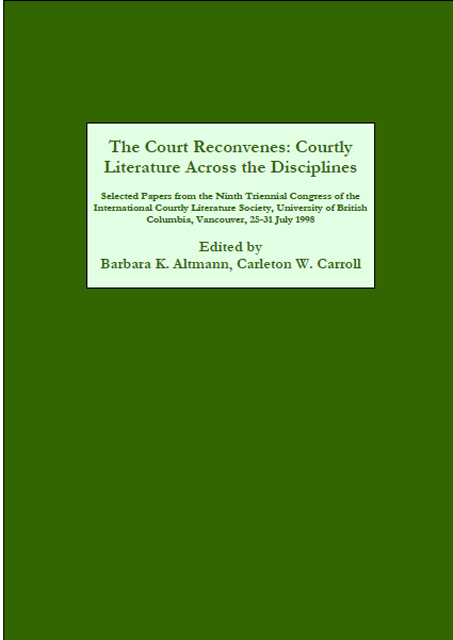 The Court Reconvenes
The Court Reconvenes Women, Property and the Rise of Courtly Love
Published online by Cambridge University Press: 31 March 2023
Summary
This paper is not about women as property. The domna of the courtly canso, no less than the woman given in marriage along with real estate and/or moveable goods, can certainly be said to function as a form of property in exchanges between men (Kay, Subjectivity 111–27). However, what I am concerned with here is women as holders of power over property. Was there something special about this in Occitania which led to the rise of Courtly Love? Did Occitan women have greater powers over property than their northern French sisters, and if so, did this, as it has often been argued in the past, foster the so-called cult of the Lady (Paterson, World 258)?Was there, as Howard Bloch has more recently maintained, a significant improvement in women's freedoms and property rights at the end of the eleventh century which provoked a misogynistic reaction in the peculiar form of fin’amor? Was there perhaps a relation between troubadour culture and shifts in the types of property controlled by women?
Fin’amor has so many possible sources that the most circumspect approach to the question of its origins is to invoke their multiplicity (Brunel-Lobrichon and Duhamel Amado, 38–40; Kay, “Contradictions” 210). Nevertheless, in recent years scholarly reflection has tended to focus on socio-historical circumstances. For some, the key element has been the particular social condition of Occitan women. Typically, scholars contrast this with what are thought to have been regional differences in legal codes and customs, arguing that Occitan women enjoyed greater power and autonomy than their northern French counterparts. These historians have tended to focus almost exclusively on noblewomen, and have pointed to examples of remarkable and powerful heiresses to great allodial estates, who could autonomously “control the destinies of whole regions in the Midi and Catalonia and set the stage for their successors whom the troubadours were to praise with such fervency later” (Lewis 392; see also 211 and Paterson, World 220, n. 1). The unusual power, prestige and independence of those Occitan noblewomen would, it is suggested, have provided a focus of patronage and be mirrored in the figure of the lyric domna.
- Type
- Chapter
- Information
- The Court ReconvenesCourtly Literature across the Disciplines: Selected Papers from the Ninth Triennial Congress of the International Courtly Literature Society, University of British Columbia, Vancouver, 25-31 July 1998, pp. 41 - 56Publisher: Boydell & BrewerPrint publication year: 2002


